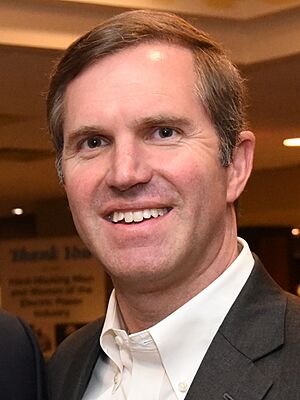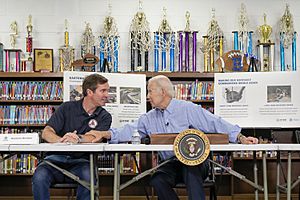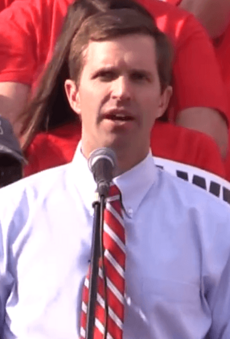Andy Beshear facts for kids
Quick facts for kids
Andy Beshear
|
|
|---|---|
 |
|
| 63rd Governor of Kentucky | |
| Assumed office December 10, 2019 |
|
| Lieutenant | Jacqueline Coleman |
| Preceded by | Matt Bevin |
| 50th Attorney General of Kentucky | |
| In office January 4, 2016 – December 10, 2019 |
|
| Governor | Matt Bevin |
| Preceded by | Jack Conway |
| Succeeded by | Daniel Cameron |
| Personal details | |
| Born |
Andrew Graham Beshear
November 29, 1977 Louisville, Kentucky, U.S. |
| Political party | Democratic |
| Spouse |
Britainy Colman
(m. 2006) |
| Children | 2 |
| Relatives |
|
| Residence | Governor's Mansion |
| Education | |
| Signature |  |
Andrew Graham Beshear ( BƏ-sheer; born November 29, 1977) is an American attorney and politician serving as the 63rd governor of Kentucky since 2019. A member of the Democratic Party, he is the son of former Governor Steve Beshear.
He was elected as the 50th attorney general of Kentucky in November 2015 and served from January 2016 to December 2019. As attorney general, he sued Governor Matt Bevin several times over issues such as pensions and ultimately defeated Bevin by just over 5,000 votes in the 2019 gubernatorial election. He won re-election to a second term in 2023 by a larger margin, becoming only the third incumbent governor in Kentucky history to win a second consecutive term.
As of 2024, he and Lieutenant Governor Jacqueline Coleman are the only Democratic statewide elected officials in Kentucky.
Contents
Early life and education
Beshear was born in Louisville, the son of Steve and Jane Beshear. He graduated from Henry Clay High School in Lexington, Kentucky. His father, a lawyer and politician, was the governor of Kentucky from 2007 to 2015.
After high school, Beshear studied anthropology at Vanderbilt University, where he was a member of the Sigma Chi Fraternity. He graduated in 2000 with a Bachelor of Arts, magna cum laude. He then attended the University of Virginia School of Law, receiving a Juris Doctor in 2003.
Legal career
In 2005, Beshear was hired by the law firm Stites & Harbison, at which his father was a partner. He represented the developers of the Bluegrass Pipeline, which would have transported natural gas liquid through Kentucky. The project was controversial; critics voiced environmental concerns and objections to the use of eminent domain for the pipeline. His father's office maintained that there was no conflict of interest with the son's representation. Beshear also represented the Indian company UFLEX, which sought $20 million in tax breaks from his father's administration, drawing criticism from ethics watchdogs over a potential conflict of interest.
Kentucky Attorney General
Beshear sued Governor Matt Bevin several times over what he argued was Bevin's abuse of executive powers during Beshear's tenure as attorney general and while he was campaigning against Bevin for governor.
Beshear resigned from the attorney general's office on December 10, 2019 before his inauguration as Governor the same day. By executive order, Beshear appointed attorney general-elect Daniel Cameron to serve the remainder of his term. Cameron was the first African American attorney general in Kentucky and unsuccessfully ran against Beshear in his re-election campaign in November 2023.
Governor of Kentucky

Beshear was inaugurated as governor on December 10, 2019. In his inaugural address, he called on Republicans, who had a supermajority in both houses of the Kentucky General Assembly, to reach across the aisle and solve Kentucky's issues in a bipartisan way.
Upon taking office, Beshear replaced all 11 members of the Kentucky Board of Education before the end of their two-year terms. The firing of the board members fulfilled a campaign pledge, and was an unprecedented use of the governor's power to reorganize state boards while the legislature was not in session. Beshear's critics suggested that the appointments undermined the Kentucky Education Reform Act of 1990, which sought to insulate the board from political influence; the Board had increasingly been the focus of political battles in the years preceding 2019.
On December 12, 2019, Beshear signed an executive order restoring voting rights to 180,315 Kentuckians, who he said were disproportionately African-American, who had been convicted of nonviolent felonies.
In April 2020, Beshear ordered Kentucky state troopers to record the license plate numbers of churchgoers who violated the state's COVID-19 stay-at-home order to attend in-person Easter Sunday church services. The order led to contentious debate.
In June 2020, Beshear promised to provide free health care to all African-American residents of Kentucky who need it, in an attempt to resolve health care inequities that came to light during the COVID-19 pandemic.
On November 18, 2020, as the state's COVID-19 cases continued to increase, Beshear ordered Kentucky's public and private schools to halt in-person learning on November 23, with in-person classes to resume in January 2021. This marked the first time Beshear ordered, rather than recommended, schools to cease in-person instruction. Danville Christian Academy, joined by Attorney General Daniel Cameron, filed a lawsuit in the United States District Court for the Eastern District of Kentucky, claiming that Beshear's order violated the First Amendment by prohibiting religious organizations to educate children in accordance with their faith. A group of Republican U.S. senators supported the challenge. The U.S. Court of Appeals for the Sixth Circuit and the U.S. Supreme Court upheld Beshear's order.

In March 2021, Beshear vetoed all or part of 27 bills that the Kentucky legislature had passed. The legislature overrode his vetoes.
Beshear's tenure in office has been marked by several natural disasters. In December 2021, Beshear led the emergency response to a tornado outbreak in western Kentucky, which devastated the town of Mayfield and killed more than 70 people, making it the deadliest in the state's history. In July 2022, torrential rain caused severe flooding across Kentucky's Appalachia region and led to the deaths of over 25 people; Beshear worked with the federal government to coordinate search and rescue missions as President Biden declared a federal disaster to direct relief money to the state.
Political positions
COVID-19
On March 25, 2020, Beshear declared a state of emergency over the COVID-19 pandemic. He encouraged business owners to require customers to wear face coverings while indoors. He also banned "mass gatherings" including protests but not normal gatherings at shopping malls and libraries; constitutional law professor Floyd Abrams and lawyer John Langford opined that Beshear's order was inappropriate as it violated public protests' special protected status under the First Amendment.
In August 2020, Beshear signed an executive order releasing inmates from prisons and jails in an effort to slow the virus's spread. The Kentucky Department of information and Technology Services Research and Statistics found that over 48% of the 1,704 inmates released committed a crime within a year of their release and that a third of those were felonies.
Beshear was criticized for not calling the Kentucky General Assembly into a special session (a power only the governor has) in order to work with state representatives to better address the needs of their constituents during the pandemic. In November 2020, the Kentucky Supreme Court upheld the constitutionality of Beshear's emergency executive orders. In late November 2020, Beshear imposed new restrictions to further slow the spread of COVID-19, including closing all indoor service for restaurants and bars, restricting in-person learning at schools, limiting occupancy at gyms, and limiting social gatherings.
On June 11, 2021 Beshear lifted most of Kentucky's COVID-19 restrictions.
Economic policy

In 2019, Beshear pledged to bring more advanced manufacturing jobs and health care jobs to Kentucky, to offset job losses due to the decline of coal.
Beshear opposes the Kentucky right-to-work law.
After the Kentucky legislature voted to allow Kentucky distilleries and breweries to qualify for a sales tax break on new equipment, Beshear vetoed the provision. In April 2020, the Kentucky legislature overrode the veto.
In June 2021, Beshear signed an executive order to allow name, image, and likeness compensation to be received by college athletes. It made Kentucky the first state to do so via executive order; six other states had done so through their legislatures.
Education
In 2019, Beshear pledged to include a $2,000 pay raise for all Kentucky teachers in his budgets (at what he estimated would be a cost of $84 million). Republican House Majority Floor Leader John Carney rejected the proposal. Beshear has proposed such a pay raise in his budgets, but the Kentucky legislature has not included such raises in the budgets it passed.
Beshear is opposed to all charter schools in Kentucky, saying "schools run by corporations are not public schools." He says that funding them would violate the state constitution.
Environment
Beshear accepts the scientific consensus on climate change. In 2019, he said he wanted to create more clean energy jobs to employ those who lose their jobs in the coal industry and to expand clean coal technology in Kentucky.
Gun rights
Beshear said he would not support an assault weapons ban. He said he would instead support a red flag law authorizing courts to allow police to temporarily confiscate firearms from people a judge deemed a danger to themselves or others.
Health care
Beshear supports Kentucky's Medicaid expansion, which provides affordable health care to over 500,000 Kentuckians, including anyone with a preexisting condition. He criticized Bevin for trying to roll back the state's Medicaid expansion (which ultimately failed). As attorney general and governor, Beshear expressed support for the Affordable Care Act and criticized efforts to strike the law down in the courts. On October 5, 2020, he announced the relaunch and expansion of kynect, the state health insurance marketplace that was started in 2013 during Steve Beshear's term as governor and dismantled by Bevin in 2017.
Immigration
In December 2019, Beshear told President Donald Trump's administration that he planned to have Kentucky continue to accept refugees under the U.S. immigration program. Trump had told state governments that they had the power to opt out of the U.S. refugee resettlement program.
Infrastructure
Beshear supports a $2.5-billion project to build a companion bridge to supplement the Brent Spence Bridge that carries Interstates 71 and 75 over the Ohio River between Covington, Kentucky, and Cincinnati, Ohio. He hoped to fund the bridge by conventional means, not tolling, but was unsure whether the state in fact had the funds to do that. In 2021, Kentucky Senator Chris McDaniel, Northern Kentucky's top Republican state lawmaker and chair of the Senate finance and budget committee, said he opposed Beshear's proposal to use the state's rainy day fund or a general fund surplus to help pay for the project.
In August 2019, Beshear promised to construct the Interstate 69 Ohio River Bridge between Henderson, Kentucky, and Evansville, Indiana, by 2023, saying, "we will build that I-69 bridge in my first term as governor." The project would cost $914 million (plus financing and interest costs). He said he believed the project would provide economic benefits to Western Kentucky.
Pensions
Beshear wants to fund the state's pension system, which has accumulated $24 billion in debt since 2000, the most of any state in the country. He opposed pension cuts made by Bevin, and said he wants to guarantee all workers pensions when they retire. As of June 30, 2020, the Kentucky State Pension Fund was at 58.8% of its obligations for the coming decades.
Personal life
Beshear and his wife Britainy are members of the Christian Church (Disciples of Christ) and both are deacons. They have two children.
See also
 In Spanish: Andy Beshear para niños
In Spanish: Andy Beshear para niños


